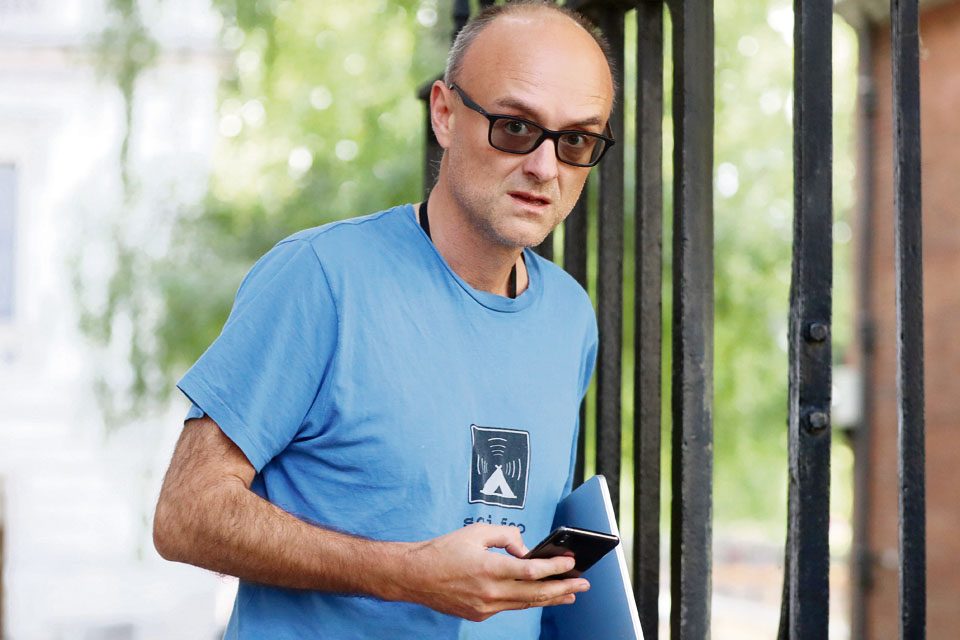Dominic Cummings is behind Number 10’s new startup-mindset

“What we want to hear is their conquer the world strategy,” said Scott Kupor, managing partner of American venture capital firm Andreessen Horowitz.
Kupor was talking about wannabe entrepreneurs knocking on the company’s Sand Hill Road door in California and looking to become the next Twitter, Lyft, or Airbnb.
If Boris Johnson’s right-hand man Dominic Cummings were ever to make the trip to Silicon Valley, he would have a clear and unshakable pitch for Kupor: to deliver Brexit by 31 October “by any means necessary”.
As to how he achieves his goal, Cummings seems to be employing startup-like operational strategies.
There is a clear mission statement, reinforced by the Brexit countdown clocks brought into the office.
There are the long hours – Cummings has been both praised and derided in the media for holding meetings with special advisers at 7.55am on Mondays and 6pm on Fridays, when in the last days of Theresa May’s regime, these meetings were reportedly routinely cancelled.
The top aides have also been asked to “produce a list of tasks” for their ministries, to “interrogate” officials and flag no-deal Brexit planning issues with Number 10 as they are identified.
It is no surprise, then, that Cummings was photographed sporting an OpenAI T-shirt when Boris entered Number 10 for the first time in July.
OpenAI was co-founded Elon Musk – of Tesla, SpaceX, and PayPal fame. Musk’s ventures are lean and continually challenge the status quo of whatever sectors they operate in.
A SpaceX-related section of Ashlee Vance’s biography of Musk is eerily reminiscent of Cummings’ demands to special advisers. “Make sure your output is high,” SpaceX president Gwynne Shotwell reportedly told a group of new recruits, urging them to be effective and pushy. “If we’re throwing a bunch of s**t in your way, you need to be mouthy about it.”
Westminster shouldn’t be surprised if Cummings inserted a new clause at the top code of conduct for special advisers along the lines of “get stuff done”.
And, like Musk, the new-look Number 10 isn’t his first disruptive venture. Cummings set up what would become Vote Leave, the self-described “guerrilla operation” that sought to win the EU referendum “against almost every force with power and money in politics”.
This was a success. Cummings’ post-university adventures in Russia, when he allegedly spent three years attempting to establish a new airline with a route from Samara to Vienna, was not.
Musk had a similarly torrid time in Russia in 2001 when he went rocket shopping, as you do. The Russians failed to budge on their high price for the ICBMs motors he was after and mocked the South African-born businessman. Musk went onto build his own rocket.
This entrepreneurial flair is similar to Cummings, who oversaw the creation of Vote Leave’s own software, the Voter Intention Collection System, after being disappointed with canvassing software on the market ahead of the 2016 EU referendum.
And the comparisons between the two men don’t end there. Their shared deep interest in space gives us some insight as to what might happen soon inside Number 10.
“Here is a photo of a recent Nasa mission control room,” Cummings explained in a June blog post. “The room is set up so that all relevant people can see relevant data and models at different scales and preserve a common picture of what is important. Nasa pioneered thinking about such rooms and the technology and tools needed in the 1960s.”
Will we be seeing touchscreens in the cabinet room next? Not until Brexit is delivered, I suspect.